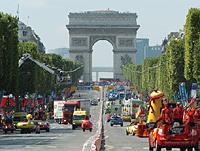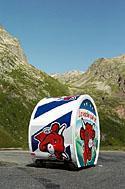
Recently on Cyclingnews.com |
Tales from the peloton, November 26, 2006
Sponsors - who needs them?
Well, in cycling, just about everyone. Les Woodland looks back at a few of the more kooky, those that are now banned, and how they've been portrayed in the peloton.

|
Phil Anderson, who was one of Australia's greatest riders of recent times, says people are always asking him to set up and run an Aussie team in Europe. A real Australian team with a real Australian sponsor. To which he shrugs and says "Well, yeah it'd be a nice idea" and then points out he is a gentleman farmer happy in his retirement.
But, he says, he'd be lying if the idea didn't appeal to him. There aren't that many Australian companies with a big enough name internationally to find interest in a team based in Europe, he says, but the people who make Foster's lager could be one. You can get Foster's everywhere.
"There is often no shame in cycling when it comes to grasping someone else's money" |
The trouble is that it wouldn't be allowed. The point of the team would be to ride the Tour and French rules on alcohol advertising rule out a bike team. When the Heineken Cup rugby series is played in France, it is referred to only as the H-Cup. When a British team turned up in France with jerseys bearing the name of Brain, the brewery that sponsors it, officials got round the rule by changing Brain to Brawn. Showing that sometimes, rugby players aren't all brawn and no brain.
Back in the 1960s, drinks companies were everywhere. Carpano had a team and Martini had such a grip on the points competition in the Tour de France that the organisers couldn't find a sponsor to replace it. Pelforth had a team led by the Dutchman Jan Janssen and St-Raphaël boasted Jacques Anquetil. Margnat had Federico Bahamontes. But then France realised the alcoholism had become such a problem that there was little point in sponsors advertising wine and aperitif because the French could barely drink any more than they were already. In came a ban and out went the drink people's money.
There is, however, a sense of strength and power that comes from having a drinks company, or any other household name, in your sport. Things have so changed that cycling to some has become little more than a refuge for shady men with wallets waiting for the money to flow in, not out. Where once Ford had a team, and the electronics giant EMI, we now have moneylenders like Cofidis and gambling concerns like Unibet which, illegal on solid ground, operate instead from Internet bases. There's not a great deal more class in being backed by more down-to-earth gambling outfits such as Lotto, Française des Jeux and PMU (for the Tour points prize).
They're not, however, the oddest sponsors that cycling has seen. The Parisian nightclub dancer Myriam De Kova advertised tickets to see her legs even when she was 70. Her husband, a Greek millionnaire in New York, had died and Myriam became a merry widow. One night she met Roger Rivière and Raphaël Géminiani and was persuaded to run a team in her own name, wearing a pink jersey.
De Kova wasn't the only entertainer to seek fame on the backs of the peloton. In Britain, the veteran jazz man Chris Barber wondered who the fit young men were who stood out so much from the long-haired, baggy-sweatered types who made up his usual audience on an island in the river Thames.

|
He asked and found they were bikies. Barber was intrigued, perhaps because it also takes a lot of puff to blow a trumpet, and he agreed a deal which put a team into the British pro peloton for several years. I met him once and he said he hadn't the slighted idea whether they ever sold him a single extra record but the idea just appealed.
Cigarette companies had a strong interest in supporting cycling because it associated nicotine with health and lung power. Willem II was one example. They too vanished with advertising legislation. But because the new laws came in at different times, it was possible for Boule d'Or to have a team in Belgium but not in France and therefore not in the Tour de France. To get round it, the company tried to transfer its entire team and all its money to a tiny and doubtless surprised French chocolate maker who happened to have the same name.
There is often no shame in cycling when it comes to grasping someone else's money. What other reason can there be for riders' willingness to dress up in make-believe yellow and blue dungaree work suits to advertise Castorama? The French do-it-yourself chain dressed all its workmen that way and saw no reason not to have its riders dressed similarly. Except that it looks right when you're driving a forklift truck and, er, not quite right when you're riding a bike.
Still, on the other hand, the British Holdsworth-Campagnolo team of the 1960s and 1970s also saw no reason to blush when it put out a press statement and added transfers to its team car boasting the fact that its riders wore Y-Fronts.
Access to the rostrum of the Tour de France is now strictly limited after the country's minister of youth watched the final stage in horror one year. She went as far as counting the advertising logos on the winner's clothing - something like three dozen - and proclaimed herself horrified. Jacques Goddet remembers she turned and said "Any day now you will be boasting to the crowd that this afternoon the Marseillaise [the French national anthem] is brought to you courtesy of Guy Merlin, real estate developer."
Given that ministers rarely say things when they can't be heard, the remark was broadcast all over France. The organisers, perhaps conscious themselves of what a tack-fest they had created of their event, were not amused.
So what comes next? Well, consider this: boxers in Germany have taken to wearing advertising stencilled to their bare backs. Contraceptive advertising, in fact. Cyclists don't have bare backs but they do have bare legs.
Just a matter of time, perhaps?
